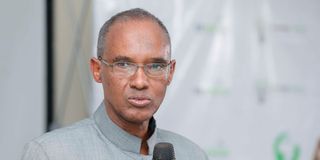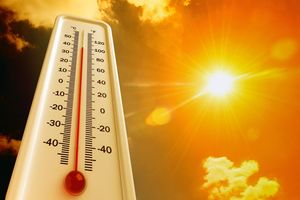What US exit from Paris climate pact means for Africa

Mr Ali Mohamed, chairman of the African Group of Climate Change Negotiators and Kenya’s Special Envoy on Climate Change, at a past event. He says he is deeply disappointed by the unilateral decision by President Donald Trump to withdraw the United States from the Paris Agreement and promote polluting energy systems.
What you need to know:
- Trump's executive actions come days after the World Meteorological Organization confirmed that 2024 was the hottest year on record, based on six international datasets.
President Donald Trump moved to withdraw the United States from the Paris climate agreement on his first day back in office, threatening global climate action as African nations grapple with escalating environmental crises.
The executive order, signed hours after his inauguration, directs an immediate halt to US climate commitments and commands the State Department to begin withdrawal procedures from the 2015 accord, which aims to limit global warming to 1.5 degrees Celsius above pre-industrial levels.
This dramatic shift in US climate policy comes just days after the World Meteorological Organisation confirmed 2024 as the hottest year on record, with climate-fueled disasters intensifying worldwide, including devastating fires in Southern California.
"This is a direct threat to global efforts to limit temperature rise and avert catastrophic impacts of climate change, particularly for the world's most vulnerable nations," said Ali Mohamed, chairperson of the African Group of Negotiators (AGN), in a strongly worded statement.
The United States, responsible for 13.5 per cent of global emissions - more than four times Africa's total contribution - had previously pledged significant financial support for climate action in developing nations. Trump's withdrawal threatens a recent $300 billion climate finance deal reached at the COP29 talks in Baku, Azerbaijan.
"What we're seeing is that one of the key players who should lead the mobilisation of climate finance has pulled out," explains Julius Mbatia, a climate policy expert. "We should not expect anything coming from the United States on climate in light of the Paris Agreement obligations."
Trump's broader climate agenda includes declaring a "national energy emergency" and reversing several Joe Biden administration’s initiatives such as
halting land and water leasing for wind energy projects, rolling back electric vehicle initiatives, doubling down on fossil fuel production and removing climate change references from White House websites.
African leaders and experts warn that this policy reversal could have severe consequences for the continent, which is already experiencing intensifying climate impacts despite contributing minimally to global emissions.
"Climate change-related disasters do not conform to political ideologies," said Jiwoh Abdulai, Sierra Leone's Minister of Environment. "We need continued multilateral commitment to collective action, especially by countries with historical responsibility for greenhouse gas emissions."
Dr Joyce Kimutai, a climate scientist at Imperial College London and Kenya Meteorological Department, emphasised that the science remains clear regardless of political shifts. "While surpassing the Paris Agreement goal seems inevitable, bold and immediate steps must be taken by every nation. Climate change will continue to affect us all."
Some experts remain optimistic about global climate action's resilience. Laurence Tubiana, CEO of the European Climate Foundation and a key architect of the Paris Agreement, called Trump's decision "unfortunate" but noted that multilateral climate action "has proven resilient and is stronger than any single country's politics."
Africa's vulnerability to climate change has intensified significantly, with the continent warming faster than the global average. According to the World Meteorological Organisation, temperatures across Africa are rising at 0.3°C per decade, with regions like the Sahel experiencing even faster increases. This accelerated warming has already cost African economies an estimated $525 billion since 2000. In East Africa alone, recent climate-related disasters have affected over 50 million people, while West Africa faces losing up to 15 per cent of its GDP by 2050 due to climate impacts.
The US’ withdrawal mirrors its 2017 Paris Agreement exit under Trump's first term, when African nations lost access to nearly $2 billion in promised climate funding. That exodus prompted China to step up its climate cooperation with Africa, investing $43 billion in renewable energy projects across the continent between 2017 and 2021. The US returned to the agreement under President Biden in 2021, pledging $11.4 billion annually by 2024 to support climate action in developing nations – commitments now thrown into doubt by Trump's latest withdrawal.
African climate advocates are calling for strengthened regional response. "Africa is a key player in the climate multilateral space, and this is not about to change," said Fred Njehu, Pan-African political strategist for Greenpeace Africa. "Trump attempting to sabotage global efforts to tackle the climate crisis is a huge threat to our future, but Africa will not stop in the face of those who choose to risk everything for the profit of a privileged few."
The AGN stated it would continue demanding accountability from all nations while remaining committed to working with the United States and other countries "to ensure that multilateralism continues to serve as the foundation for global climate action."
Faten Aggad, executive director of the African Future Policies Hub, called for other industrialised nations to step up. "This is the moment for stronger leadership from industrialised economies, whose higher ambition is the only way forward to compensate for the USA's failures."
While the withdrawal process from the Paris Agreement typically takes a year, the White House has already directed the US Ambassador to the United Nations to "immediately cease or revoke any purported financial commitment" under the UN Framework Convention on Climate Change.
Global Emissions Context
• United States: 13.5 per cent of global emissions
• Africa (entire continent): 3.2 per cent of global emissions
• Paris Agreement signatories: 195 countries
• Non-signatories: Yemen, Iran, Libya
lnjeru@ke.nationmedia.com


